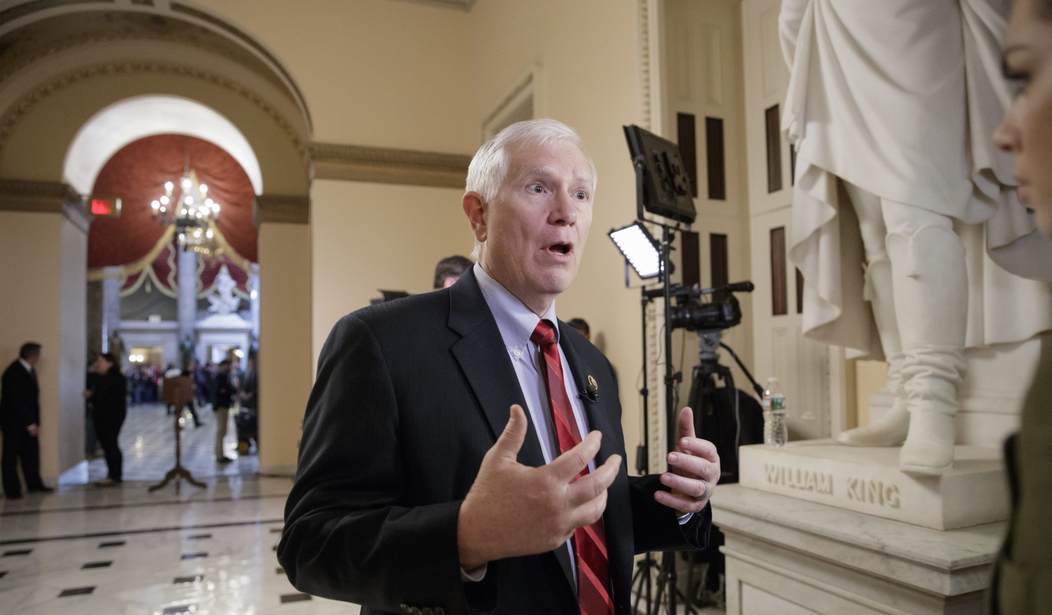WASHINGTON – Rep. Mo Brooks (R-Ala.) said any member of Congress who refuses to figure out ways to reduce federal spending and move closer to a balanced budget is “betraying their country and betraying the future of our kids and grandkids.”
The U.S. national debt recently surpassed $20 trillion.
“Everyone who refuses to examine this issue and come up with constructive ways to cut federal government spending so we can balance our budget and minimize our risk of insolvency and bankruptcy, everyone who refuses to do that is betraying their country and betraying the future of our kids and grandkids because they’re going to suffer enormously from the burden that we’re placing on those who have no right to vote because they’re not old enough or aren’t even alive yet,” Brooks said during an interview with PJM on Capitol Hill. “We’re talking about America’s future here.”
Brooks urged Congress to begin the process of entitlement reform for future beneficiaries.
“We have to look at everything, every bit of spending that we engage in, in order to do our utmost to minimize our risk of America going through a debilitating insolvency and bankruptcy, which, if you follow the cascading effects of insolvency and bankruptcy, would likely cost millions of American lives,” he said.
“Nothing can be off the table, although some things have to be last resorts like Social Security and Medicare. But then again, they’re expected to be in the red, revenue streams being insufficient to pay benefits with Medicare in the 2020s and Social Security in the 2030s,” he added.
Brooks suggested raising the retirement age as well or increasing the “number of quarters” taxpayers have to work before collecting Social Security and Medicare benefits.
“So we also have to look at them and try to figure out a way where we can preserve the current benefit package, ideally by raising the age in which people are entitled to receive those benefits,” he said. “Or else, increasing the number of quarters that people have to work to receive those benefits from the current 10 years and 40 quarters to something longer so that people are contributing more into the system they’re going to rely on when they reach their retirement years.”
Brooks estimated that the U.S. would go into a “debilitating insolvency” within the next 20 years if it continues on the current fiscal path.
The public debt per person, he noted, is “about $60,000 for every man woman and child in the United States of America.”
“For an average family of four it comes to about $240,000, and as much as, roughly speaking, only half of Americans pay the income taxes that ultimately will be directed towards the debt,” he said. “That means that if you’re an average family of four with an income large enough to owe income taxes, then your share of the federal debt now approaches half a million dollars.”
“I tell my constituents that if we don’t change our ways that it’s 100 percent probability of America going into debilitating insolvency and bankruptcy within 30 years, a significant probability within 20 years and a significant risk within a decade,” the congressman added. “That’s my judgment, and by way of background I do have an economics degree, highest honors, from Duke University and a major graduate with distinction, to be more precise, in economics, so I do have some understanding of economics. And it’s scary what we’re doing.”
Brooks warned that the U.S. is not “immune” to the kind of crisis that’s plaguing Venezuela right now. He cautioned that “drastic” spending cuts or “massive” tax hikes would have to take place in the future if the U.S. does not work to balance the federal budget now.
“No one is immune from basic economic principles. It doesn’t make any difference if you’re a family, if you’re a business, if you’re a city, county or state or a country. If you run out of credit, then there is tremendous hardship,” he said. “If our creditors right now were simply to tell us that we no longer want to loan money – not that the creditors demand we pay back the $20 trillion we already owe, but just that they’re not going to loan us any more money – all of a sudden, our discretionary spending has to be immediately cut by about 65 percent, or else massive tax increases have to be imposed to offset.”
Brooks continued, “So you’d be talking about a roughly 65 percent immediate cut in national defense spending – FBI, law enforcement generally, the Justice Department, go down the list because $700 billion out of roughly $1.1 or $1.2 trillion in discretionary spending is a huge adverse impact. All of a sudden, we’re on a cash basis and we have a $700 billion hole – and that’s frightening. And it should be to every American.”









Join the conversation as a VIP Member